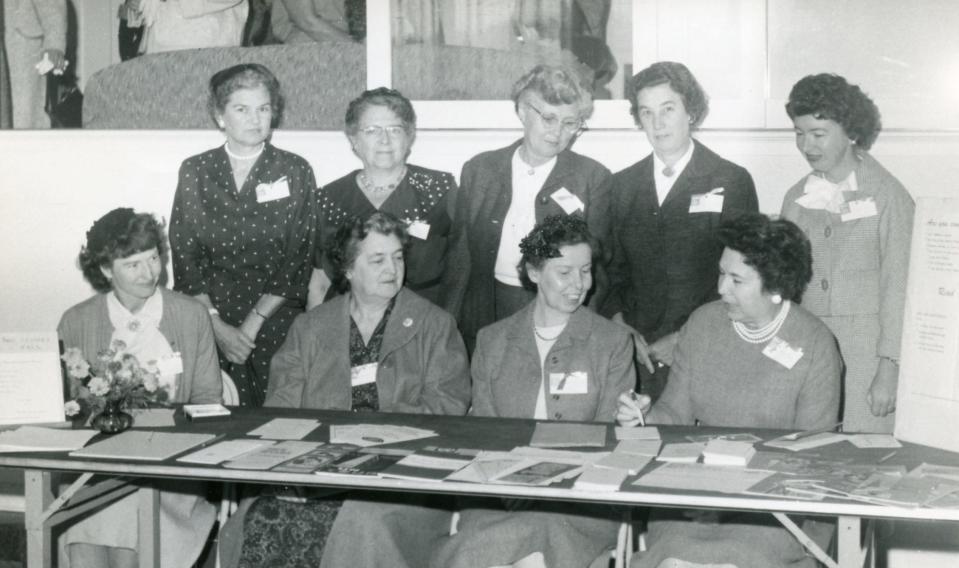Historically Speaking: The League of Women Voters in Exeter
- Oops!Something went wrong.Please try again later.
A year before the passage of the 19th Amendment that opened voting to women, suffragist Carrie Chapman Catt proposed the creation of a women’s organization to help facilitate and educate voters. Speaking before the National American Woman Suffrage Association in St. Louis, she suggested a “League of Women Voters” should the new amendment pass.
The members didn’t wait, and the League of Women Voters was organized in February 1920, months before women’s suffrage was settled in the U.S. Constitution.

In Exeter, the amendment became law just before an important primary election, and the town scrambled to get ready.
Many women were comfortable with the process – women had been voting in school board elections since the 1870s in New Hampshire. But they did need to learn some of the specifics, such as the difference between a primary and general election, how to choose a political party, and basic civics like how long are elected officials’ terms. The New Hampshire Women Suffrage Association had joined the National League of Women Voters and encouraged open house-type sessions for education.
The women swam through early elections in Exeter – surprising everyone with their abilities and knowledge. The League of Women Voters didn’t organize an Exeter chapter until after World War II. In 1947, a group of Exeter women set up a study group. Their first activity was hosting a program featuring George P. Drown, Jr., executive secretary of the New Hampshire Citizens’ Council for the General Welfare, at the vestry of the First Parish Congregational Church. The council was like the League of Women Voters, a non-partisan group that served as a clearing house for the state’s general welfare.
Historically Speaking: Life and legacy of Benjamin Swasey, Exeter’s unsung history writer
By April of that year, the Exeter study group was attending joint meetings with established branches of the League of Women Voters in Durham. They held their first official meeting as an independent branch the following year.During the summer of 1947, the New Hampshire Legislature passed a bill that allowed women to serve on juries. The League had backed the passage, and after it became law, there were sessions to answer questions. The Exeter News-Letter ran an article, “the following questions and answers have been prepared by them (the League of Women Voters) to explain to the women in this state that there are compensations of more than a pecuniary nature for those women who are willing to accept their responsibility as citizens” and to encourage them to accept jury duty.
Although the League is non-partisan, it has always produced statements on policy. This has sometimes led to criticism. In late 1947 (before the Exeter group was officially recognized), the Exeter News-Letter published an editorial that began, “Considerable resentment is felt by members of Exeter’s League of Women Voters over the implications made recently in a Manchester paper that the League’s national organization may be a Communist front. These implications stem from testimony by Walt Disney before the House Committee on un-American Activities on October 23rd. Disney has since amended his testimony by stating his criticism of the league referred to the year 1941. He further stated he had no intention of criticizing the group as of present.”
One can only suppose that accusing women – the people who purchase nearly everything, including movie tickets – of disloyalty was not a winning move for Disney. “As far as this paper is concerned there is little doubt as to the American loyalty of the league’s members in Exeter. The objectives of the organization as set forth in its constitution and by-laws are aimed at strengthening the American system of democratic government by intelligent voting.”
Historically Speaking: The rise and fall of Exeter Footwear
Meanwhile, the Exeter league got busy organizing candidate forums and creating a pamphlet called “Know Our Town.” This was updated over the years and quickly became a resource for all voters, not just women. They created study groups for local issues – such as the merger of Robinson Female Seminary and Exeter High School. They held events to discuss the Marshall Plan and nuclear non-proliferation. Nationally, the league sponsored presidential debates until 1988. They were designated as a United Nations non-governmental organization and has official observer status.
The primary goal of the league has always been to encourage voting and educate voters. Still fiercely non-partisan, the N.H. League of Women Voters continues to be the place to look when in need of voting information.
Barbara Rimkunas is the curator of the Exeter Historical Society. Support the Exeter Historical Society by becoming a member! Join online at www.exeterhistory.org.
This article originally appeared on Portsmouth Herald: Historically Speaking: The League of Women Voters in Exeter

